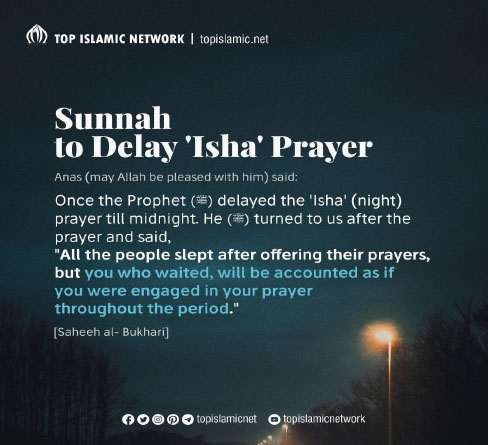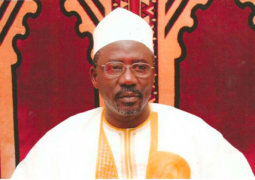
It is most virtuous to delay the night prayer until the end of the preferred time for it, which is half the night. Reported ‘Aishah, “One night the Prophet, upon whom be peace, prayed the night prayer after most of the night had gone and most of the people in the mosque had fallen asleep. Then he came out, prayed, and said, “This would be the proper time if it were not a hardship on my nation.”’ (Related by Muslim and an-Nasa’i.)
The Prophet, upon whom be peace, did not do this on a regular basis, as he heard that it would be a hardship on his nation. He would take into consideration the situation of those in the mosque. Sometimes he would hasten in performing the prayer and at other times he would delay it. Said Jabir, “The Messenger of Allah would pray the noon prayer during the hottest time of noon, the afternoon prayer when the sun was clear, the sunset prayer when the sun had gone down, and the night prayer he would sometimes delay and sometimes hasten if he found people gathered (in the mosque). If he noticed that they were lingering, he would delay it. He would pray the morning prayer while it was still dark.” (Related by al-Bukhari and Muslim.)
Sleeping Before the Night Prayer Is Forbidden
One should not sleep before the night prayer, nor have discussions after it. Abu Barza al-Aslami related that the Prophet, upon whom be peace, loved to delay the night prayer (which was called darkness, al’atmah) and he hated sleeping before it and talking or discussions after it.” (Related by “the group.”) In another saying by Ibn Mas’ud, it is reported, “The Messenger of Allah ordered us not to talk after the night prayer.” (Related by Ibn Majah.)
The reasons behind this are: sleep may make a person miss the night prayer in its best time, or it may cause him to miss the congregational prayer, and talking and socializing afterwards would cause one to misappropriate a time from which he could greatly benefit. If one wants to sleep and has someone to wake him up, or he is discussing a beneficial matter, then it is not disliked. Said Ibn ‘Umar, “The Prophet would discuss with Abu Bakr some of the affairs of the Muslims during the night, and I was with him.” (Related by Ahmad and at-Tirmizhi, who said it is Hassan.) Reported Ibn ‘Abbas, “I slept in the home of Maimunah one night when the Prophet, upon whom be peace, was there. I watched to see how the Prophet prayed during the night. He talked with his wife for a while and then slept.” (Related by Muslim.)
The Time of the Morning Prayer (Fajr)
The time of the morning prayer begins with the true dawn and lasts until sunrise. It is preferred to pray it early in its permissible time. Abu Mas’ud al-Ansari reported that the Messenger of Allah prayed the morning prayer in the darkness (of the dawn). Another time, he prayed it when the dawn was shining (or glowing). Then after that, he always prayed in the darkness (of the dawn) until he died.” (Related by Abu Dawud and al-Baihaqi. Its chain is sahih.) Said ‘Aishah, “Believing women would pray the morning prayer with the Prophet, upon whom be peace, being enveloped in their clothing. They would return to their homes after the prayer and no one could recognize them due to the darkness (of the dawn).” (Related by “the group.”)
Rafa’ ibn Khadeej related a hadith in which the Prophet, upon whom be peace, said, “Make the morning prayer at daybreak, as your reward will be greater.” In another version it states, “Make the morning prayer at the shining (time of the dawn), as your reward will be greater.” (Related by “the five.” At-Tirmizhi and Ibn Hibban grade it as sahih.) It refers to the time that one finishes the prayer, not the time when one begins it. That is, one should make the recital long so that one is in prayer until the dawn becomes “shiny.” This is what the Prophet, upon whom be peace, used to do, for he would recite between 60 and 100 verses. It also means to make sure that the dawn has come.
Performing One Rak’ah During the Time of Prayer
Whoever catches a rak’ah of prayer before its time has expired has caught the entire prayer in its time. Abu Hurairah reported that the Prophet, upon whom be peace, said, “Whoever catches one rak’ah of the prayer has caught the prayer.” (Related by “the group.”) This refers to any of the prayers. Al-Bukhari has recorded, “Whoever of you catches one prostration of the afternoon prayer before the sun has set should complete his prayer. If one of you catches one prostration of the morning prayer before the sun has risen, he should complete his prayer.” Here the meaning of prostration is rak’ah. The clear meaning of the hadith is that one who catches one rak’ah of the morning or afternoon prayer should complete the prayer even if the sun is setting or rising, also those are times in which it is not liked to pray. If one rak’ah is performed, then the prayer is to be completed and the obligation of prayer will have been fulfilled, although it is not allowed to intentionally delay those prayers until such times.
Sleeping Through or Forgetting the Prayer
Whoever sleeps through or has forgotten to pray a certain prayer should pray it when he wakes up or remembers the prayer. Abu Qatadah related that sleeping through the prayer time was mentioned to the Prophet, upon whom be peace, and he said, “There is no negligence in sleep, but negligence occurs while one is awake. If one of you forgets a prayer or sleeps through its time, then he should pray it when he remembers it.”
As to the authenticity of the report, it is recorded by an-Nasa’i and at-Tirmizhi, who said it is sahih.
Anas related that the Prophet, upon whom be peace, said, “Whoever forgets a prayer should pray it when he remembers it, and there is no expiation for it save that.” (Related by al-Bukhari and Muslim.) Reported ‘Imran ibn Husain, “We went with the Messenger of Allah during the night. When the last portion of the night came, we became tired and fell asleep. We did not wake until we felt the heat of the sun. Some of us tried hurriedly to purify ourselves. The Prophet ordered us to be calm. Then we rode on until the sun had risen and we made ablution. He ordered Bilal to make the call to prayer, and then prayed two rak’ah before the (obligatory) morning prayer. Then we stood and prayed. We said, ‘O Messenger of Allah, should we not repeat it tomorrow in its proper time?’ He said, ‘Would your Lord the
Most High forbid you from interest and accept it from you?”’ (Related by Ahmed and others.)
The Times in Which the Prayers Are Prohibited
It is forbidden to pray after the morning prayer until the sunrise and from the sunrise until the sun has completely risen to the length of a spear above the horizon, and when the sun is at its meridian until it moves slightly to the west, and after the afternoon prayer until the sun sets. Abu Sa’eed reported that the Prophet, upon whom be peace, said, “There is no prayer after the morning prayer until the sun rises.” (Related by al-Bukhari and Muslim.) ‘Amr ibn ‘Abbas related that he said, “O Prophet of Allah, inform me about the prayers.” He said, “Pray the morning prayer and then abstain from prayer until sunrise and the sun has completely risen, for it rises between the horns of Satan. That is when the unbelievers prostrate to it. Then pray, as your prayer will be witnessed and attended to until the shadow of a spear becomes less than its length. At that time stop praying, for at that time the hell-fire is fed with fuel. When the shade comes, you may pray, for your prayer will be witnessed and attended (to by angels) until you pray the afternoon prayer. Then abstain from praying until the sun sets, for its sets between the horns of Satan, and that is when the unbelievers make prostrations to it.” (Related by Ahmad and Muslim.)
Said ‘Uqbah ibn ‘Amr, “There are three times during which the Prophet prohibited us from praying or burying our deceased: sunrise until the sun has risen (some distance), when the sun is at its meridian, and when the sun is setting until it has completely set.” (Related by “the group,” except for al-Bukhari.)
TO BE CONTINUED




